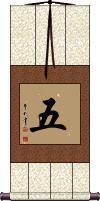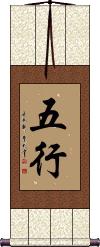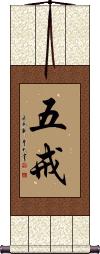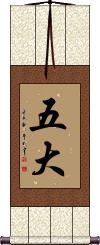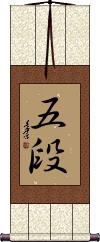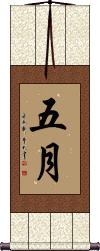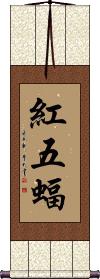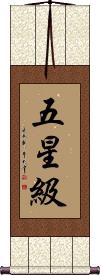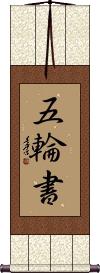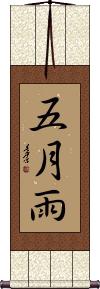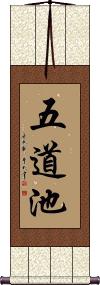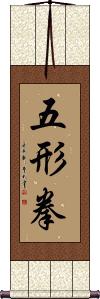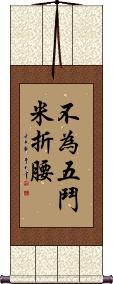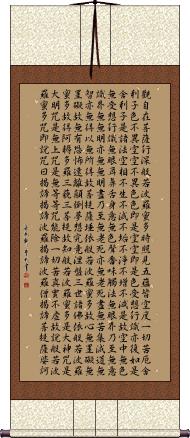Many custom options...
And formats...

五 in Chinese / Japanese...
Buy an 五 calligraphy wall scroll here!
Personalize your custom “五” project by clicking the button next to your favorite “五” title below...
1. Five
5. Go-Dan / 5th Degree Black Belt
8. Five Star
10. Samidare
11. Wutaochi
12. Wu Xing Fist
15. The Way of Five Pecks of Rice
16. Five Elements Tai Chi Fist
17. The one who retreats 50 paces mocks the one to retreats 100
19. Heart Sutra
Five
The number five
五 is the number five in Chinese, Japanese Kanji, and old Korean Hanja.
This is a strange selection for a wall scroll, so it's here mostly for reference. I guess it's OK if the number five is important to you.
![]() Because this character is rather simple (just four strokes), there is an anti-fraud way to write three on bank documents. These variants are shown to the right. This version can also refer to a squad of five soldiers, or in Korean, refer to rank.
Because this character is rather simple (just four strokes), there is an anti-fraud way to write three on bank documents. These variants are shown to the right. This version can also refer to a squad of five soldiers, or in Korean, refer to rank.
Five Elements
五行 is the title of the five elements: wood, fire, water, earth, and metal.
The first character means five, and the second character is simply element(s).
According to ancient Chinese science, all matter in the world is comprised of these elements. One idea presented with the five elements is that when energy is added, the matter is believed to expand. When energy is removed, matter contracts. Oddly, this concept is not far from Einstein's theories and modern science. Just a few thousand years before Einstein.
More info: Wikipedia - Five Elements (Wu Xing).
Five Precepts
五戒 is the title or name for the five precepts of Buddhism.
These are prohibitions against killing, theft, sexual misconduct, lying, and intoxication.
Also phrased as commandments against murder, stealing, adultery, false speech, and consuming intoxicating liquors.
These five precepts or “pañca-veramaṇī” apply to the Buddhist laity as well as monks and nuns. The observance of these five ensures rebirth in the human realm.
Godai / Five Elements
五大 is the Japanese title for the five elements.
In Japan, the five elements differ slightly from the original Chinese. Therefore, in Japanese philosophy, you have earth, water, fire, wind, and void (space).
The meaning of the first character is 5, but the second character means great or large. Some translate this as the five majors. 大 is only understood as “elements” when you have 五 in front of it.
In Buddhism, this can be short for 五大明王, or the five great and wise kings.
Go-Dan / 5th Degree Black Belt
The Month of May
Fifth Month
五月 is the month of May in Chinese, Japanese Kanji, and old Korean Hanja.
This was originally the fifth month of the Chinese lunar year, now used for the fifth month of the Gregorian calendar (also known as the Western or Christian calendar). 五月 literally means “fifth month” or “fifth moon.”
Note: Sometimes Japanese parents will use this as a female given name, and use "Mei" (the sound of May in English) as the pronunciation.
Five Red Bats
紅五蝠 is a play on words in Chinese because of some homophones.
The first thing you need to know is that the word for bat, 蝠, sounds exactly like the word for good fortune, 福. Thus, bats are often associated with good luck and good fortune in Chinese culture.
Five bats (五福 / 五蝠) means “five fortunes,” referring to luck, prosperity, wealth, happiness, and longevity.
The word red, 红, has the same sound as 宏 meaning vast, great, or magnificent. Therefore, a red bat means “vast fortune.”
Altogether, five red bats represent vast reaches of the five fortunes.
Five Star
The Book of Five Rings
五輪書 is the Japanese title for “The Book of Five Rings.”
五輪書 is a martial arts treatise by Miyamoto Musashi written around 1643.
Technically, these three characters are “Go Rin Sho” but an unwritten “の” or “no” which is a possessive article like the English “of” is verbally added by most Japanese. Therefore, many write this in Romaji as “Go Rin No Sho.”
Samidare
Wutaochi
Wu Xing Fist
Five Forms Fist of Kung Fu
Five Ancestors Fist
五祖拳 is a martial arts concept (or school) known as Five Ancestors' Fist.
The first character means five.
The second means ancestor, forefather, or grandparents.
The third means fist.
The ancestors referred to by this title and whose attributes contribute to this style are as follows:
1. Grace of the White Crane.
2. Agility of the Monkey.
3. Precision and skill of Emperor Taizu (great mythical ancestor).
4. Power of Luohan (Buddhist arhat).
5. Breath of Damo (founder of Buddhism, or the first Buddha).
Blessings on this Home
五福臨門 means “five good fortunes arrive [at the] door.”
It is understood to mean “may the five blessings descend upon this home.”
These blessings are known in ancient China to be: longevity, wealth, health, virtue, and natural death (living to old age). This is one of several auspicious sayings you might hear during the Chinese New Year.
The Way of Five Pecks of Rice
Five Elements Tai Chi Fist
五行太極拳 is a certain school or style of Tai Chi (Taiji).
The characters literally mean “Five Elements Tai Chi Fist.”
Notes:
In Taiwan, it would be Romanized as “Wu Hsing Tai Chi Chuan” - see the standard Mandarin method above in the gray box (used in mainland China and the official Romanization used by the Library of Congress).
The last three characters are sometimes translated as “Grand Ultimate Fist,” so the whole thing can be “Five Elements Grand Ultimate Fist” if you wish.
I have not confirmed the use of this title in Korean but if it is used, it's probably only by martial arts enthusiasts. The pronunciation is correct, as shown above for Korean.
The one who retreats 50 paces mocks the one to retreats 100
The pot calls the kettle black
五十步笑百步 is a Chinese proverb that means the one who retreats 50 paces mocks the one who retreats 100 paces.
During the Warring States Period of what is now China (475 - 221 B.C.), the King of Wei was in love with war. He often fought with other kingdoms just for spite or fun.
One day, the King of Wei asked the philosopher Mencius, “I love my people, and all say I do the best for them. I move the people from famine-stricken areas to places of plenty and transport grains from rich areas to the poor. Nobody goes hungry in my kingdom, and I treat my people far better than other kings. But why does the population of my kingdom not increase, and why does the population of other kingdoms not decrease?”
Mencius answered, “Since you love war, I will make this example: When going to war, and the drums beat to start the attack, some soldiers flee for their lives in fear. Some run 100 paces in retreat, and others run 50 steps. Then the ones who retreated 50 paces laugh and taunt those who retreated 100 paces, calling them cowards mortally afraid of death. Do you think this is reasonable?
The King of Wei answered, “Of course not! Those who run 50 paces are just as timid as those who run 100 paces.”
Mencius then said, “You are a king who treats his subjects better than other kings treat their people, but you are so fond of war that your people suffer from great losses in battle. Therefore, your population does not grow. While other kings allow their people to starve to death, you send your people to die in war. Is there any difference?”
This famous conversation led to the six-character proverb shown here. It serves as a warning to avoid hypocrisy. It goes hand-in-hand with the western phrase, “The pot calls the kettle black,” or the Biblical phrase, “Before trying to remove a splinter from your neighbor's eye, first remove the plank from your own eye.”
Having High Principles
Do not bow down for the sake of five pecks of rice
不为五斗米折腰 is a Chinese idiom/proverb that speaks of being above bribes and not losing face or honor for short-term gain.
Some may also translate the perceived meaning as “high-hearted” or “integrity beyond reproach.”
The more literal meaning is “Do not bow down for the sake of five pecks of rice.”
Heart Sutra
This is the Heart Sutra in Chinese as translated by Xuanzang.
The Heart Sutra is often cited as the best-known and most popular of all Buddhist scriptures.
Notes: There are too many characters for this to be done by the economy calligrapher. You must choose a Master Calligrapher.
With this many characters, and the fact that one tiny mistake wipes out hours of work, keep in mind that writing the Heart Sutra is usually a full day of work for a calligrapher. This work and personal energy should be cherished and respected. In other words, the calligrapher is not charging enough money for the value that you are getting here.
Also, you will find that as my server processes 260 characters, the customization process is a bit slow for this title.
Not the results for 五 that you were looking for?
Below are some entries from our dictionary that may match your 五 search...
| Characters If shown, 2nd row is Simp. Chinese |
Pronunciation Romanization |
Simple Dictionary Definition |
五 see styles |
wǔ wu3 wu uu / u ウー |
More info & calligraphy: Five(numeric) five (chi: wǔ); (surname) Go pañca, five. |
五大 see styles |
wǔ dà wu3 da4 wu ta godai ごだい |
More info & calligraphy: Godai / Five ElementsThe five elements— earth, water, fire, wind, and space. v. also 五行 the five agents. In the esoteric cult the five are the physical manifestation, or garbhadhātu, v. 胎; as being in all phenomena they are called 五輪 the five evolvers; their phonetic embryos 種子 are those of the Five Dhyani-Buddhas of the five directions, v. 五佛. |
五戒 see styles |
wǔ jiè wu3 jie4 wu chieh gokai ごかい |
More info & calligraphy: Five Preceptspañca-veramaṇī; the first five of the ten commandments, against killing, stealing, adultery, lying, and intoxicating liquors. 不殺生; 不偸盜; 不邪婬; 不妄語; 不飮酒 They are binding on laity, male and female, as well as on monks and nuns. The observance of these five ensures rebirth in the human realm. Each command has five spirits to guard its observer 五戒二十五神. |
五月 see styles |
wǔ yuè wu3 yue4 wu yüeh mei / me めい |
More info & calligraphy: The Month of May(1) (obsolete) fifth month of the lunar calendar; (2) (kana only) satsuki azalea (Rhododendron indicum); (adverbial noun) May; (female given name) Mei |
五段 see styles |
godan ごだん |
More info & calligraphy: Go-Dan / 5th Degree Black Belt |
五行 see styles |
wǔ xíng wu3 xing2 wu hsing gogyou / gogyo ごぎょう |
More info & calligraphy: Five Elements(1) (See 五大・ごだい・1) the five elements (in Chinese philosophy: wood, fire, earth, metal and water); the five phases; wu xing; (2) {Buddh} five practices of the Bodhisattvas; (3) (See 六信五行) the five pillars of Islam; (surname, given name) Gogyou The five lines of conduct. I. According to the 起信論 Awakening of Faith they are almsgiving; keeping the commandments; patience under insult; zeal or progress; meditation. II. According to the 涅槃經 Nirvana Sutra they are saintly or bodhisattva deeds; arhat, or noble deeds; deva deeds; children's deeds (i. e. normal good deeds of men, devas, and Hinayanists); sickness conditions, e. g. illness, delusion, etc.; — into all these lines of conduct and conditions a Bodhisattva enters. III. The five elements, or tanmātra— wood, fire, earth, metal, and water; or earth, water, ire, air, and ether (or space) as taught by the later Mahāyāna philosophy; idem 五大. |
五形拳 see styles |
gokeiken / gokeken ごけいけん |
More info & calligraphy: Wu Xing Fist |
五星級 五星级 see styles |
wǔ xīng jí wu3 xing1 ji2 wu hsing chi |
More info & calligraphy: Five Star |
五月雨 see styles |
samidare; satsukiame さみだれ; さつきあめ |
More info & calligraphy: Samidare |
五祖拳 see styles |
wǔ zǔ quán wu3 zu3 quan2 wu tsu ch`üan wu tsu chüan |
More info & calligraphy: Five Ancestors Fist |
五輪書 see styles |
gorinnosho ごりんのしょ |
More info & calligraphy: The Book of Five Rings |
五斗米道 see styles |
wǔ dǒu mǐ dào wu3 dou3 mi3 dao4 wu tou mi tao gotobeidou / gotobedo ごとべいどう |
More info & calligraphy: The Way of Five Pecks of Rice(hist) (See 天師道) Way of the Five Pecks of Rice (ancient Chinese Daoist movement later known as The Way of the Celestial Masters) |
五福臨門 五福临门 see styles |
wǔ fú lín mén wu3 fu2 lin2 men2 wu fu lin men |
More info & calligraphy: Blessings on this Home |
五十步笑百步 see styles |
wǔ shí bù xiào bǎi bù wu3 shi2 bu4 xiao4 bai3 bu4 wu shih pu hsiao pai pu |
More info & calligraphy: The one who retreats 50 paces mocks the one to retreats 100 |
七五 see styles |
shimegaki しめがき |
(surname) Shimegaki |
三五 see styles |
sān wǔ san1 wu3 san wu misago みさご |
several; three or five (surname) Misago |
上五 see styles |
kamigo かみご |
(place-name) Kamigo |
下五 see styles |
shimogo しもご |
(place-name) Shimogo |
丘五 see styles |
kyuugo / kyugo きゅうご |
(personal name) Kyūgo |
丹五 see styles |
tango たんご |
(personal name) Tango |
久五 see styles |
hisago ひさご |
(given name) Hisago |
九五 see styles |
kyuugo / kyugo きゅうご |
(given name) Kyūgo |
了五 see styles |
ryougo / ryogo りょうご |
(given name) Ryōgo |
二五 see styles |
nigon にごん |
(surname) Nigon |
五ケ see styles |
goka ごか |
(place-name) Goka |
五つ see styles |
itsu いつ |
(numeric) five; (personal name) Itsu |
五一 see styles |
wǔ yī wu3 yi1 wu i yukikazu ゆきかず |
5-1 (May 1st) (given name) Yukikazu |
五丁 see styles |
gochiyou / gochiyo ごちよう |
(personal name) Gochiyou |
五七 see styles |
wǔ qī wu3 qi1 wu ch`i wu chi goshichi ごしち |
memorial activity 35 days after a person's death (1) five and seven; (2) (abbreviation) (See 五七日) 35th day after a person's death |
五三 see styles |
gozou / gozo ごぞう |
(given name) Gozou |
Click here for more 五 results from our dictionary
The following table may be helpful for those studying Chinese or Japanese...
| Title | Characters | Romaji (Romanized Japanese) | Various forms of Romanized Chinese | |
| Five | 五 / 伍 五 | go | wǔ / wu3 / wu | |
| Five Elements | 五行 | gogyou / gogyo | wǔ xíng / wu3 xing2 / wu xing / wuxing | wu hsing / wuhsing |
| Five Precepts | 五戒 | go kai / gokai | wǔ jiè / wu3 jie4 / wu jie / wujie | wu chieh / wuchieh |
| Godai Five Elements | 五大 | godai | wǔ dà / wu3 da4 / wu da / wuda | wu ta / wuta |
| Go-Dan 5th Degree Black Belt | 五段 | go dan / godan | ||
| The Month of May | 五月 | satsuki / go gatsu satsuki / gogatsu | wǔ yuè / wu3 yue4 / wu yue / wuyue | wu yüeh / wuyüeh |
| Five Red Bats | 紅五蝠 红五蝠 | hóng wǔ fú hong2 wu3 fu2 hong wu fu hongwufu | hung wu fu hungwufu |
|
| Five Star | 五星級 五星级 | wǔ xīng jí wu3 xing1 ji2 wu xing ji wuxingji | wu hsing chi wuhsingchi |
|
| The Book of Five Rings | 五輪書 | go rin sho / gorinsho | ||
| Samidare | 五月雨 | samidare | ||
| Wutaochi | 五道池 | wǔ dào chí wu3 dao4 chi2 wu dao chi wudaochi | wu tao ch`ih wutaochih wu tao chih |
|
| Wu Xing Fist | 五形拳 | gokeiken | wǔ xíng quán wu3 xing2 quan2 wu xing quan wuxingquan | wu hsing ch`üan wuhsingchüan wu hsing chüan |
| Five Ancestors Fist | 五祖拳 | wǔ zǔ quán wu3 zu3 quan2 wu zu quan wuzuquan | wu tsu ch`üan wutsuchüan wu tsu chüan |
|
| Blessings on this Home | 五福臨門 五福临门 | wǔ fú lín mén wu3 fu2 lin2 men2 wu fu lin men wufulinmen | ||
| The Way of Five Pecks of Rice | 五斗米道 | gotobeidou / gotobeido | wǔ dǒu mǐ dào wu3 dou3 mi3 dao4 wu dou mi dao wudoumidao | wu tou mi tao wutoumitao |
| Five Elements Tai Chi Fist | 五行太極拳 五行太极拳 | go gyou tai kyoku ken gogyoutaikyokuken go gyo tai kyoku ken | wǔ xíng tài jí quán wu3 xing2 tai4 ji2 quan2 wu xing tai ji quan wuxingtaijiquan | wu hsing t`ai chi ch`üan wuhsingtaichichüan wu hsing tai chi chüan |
| The one who retreats 50 paces mocks the one to retreats 100 | 五十步笑百步 | wù shí bù xiào bǎi bù wu4 shi2 bu4 xiao4 bai3 bu4 wu shi bu xiao bai bu wushibuxiaobaibu | wu shih pu hsiao pai pu wushihpuhsiaopaipu |
|
| Having High Principles | 不為五斗米折腰 不为五斗米折腰 | bù wèi wǔ dǒu mǐ zhé yāo bu4 wei4 wu3 dou3 mi3 zhe2 yao1 bu wei wu dou mi zhe yao buweiwudoumizheyao | pu wei wu tou mi che yao puweiwutoumicheyao |
|
| Heart Sutra | 觀自在菩薩行深般若波羅蜜多時照見五蘊皆空度一切苦厄舍利子色不異空空不異色色即是空空即是色受想行識亦復如是舍利子是諸法空相不生不滅不垢不淨不增不減是故空中無色無受想行識無眼耳鼻舌身意無色聲香味觸法無眼界乃至無意識界無無明亦無無明盡乃至無老死亦無老死盡無苦集滅道無智亦無得以無所得故菩提薩埵依般若波羅蜜多故心無罣礙無罣礙故無有恐怖遠離顛倒夢想究竟涅盤三世諸佛依般若波羅蜜多故得阿耨多羅三藐三菩提故知般若波羅蜜多是大神咒是大明咒是無上咒是無等等咒能除一切苦真實不虛故說般若波羅蜜多咒即說咒曰揭諦揭諦波羅揭諦波羅僧揭諦菩提薩婆訶 观自在菩萨行深般若波罗蜜多时照见五蕴皆空度一切苦厄舍利子色不异空空不异色色即是空空即是色受想行识亦复如是舍利子是诸法空相不生不灭不垢不净不增不减是故空中无色无受想行识无眼耳鼻舌身意无色声香味触法无眼界乃至无意识界无无明亦无无明尽乃至无老死亦无老死尽无苦集滅道无智亦无得以无所得故菩提萨埵依般若波罗蜜多故心无罣碍无罣碍故无有恐怖远离颠倒梦想究竟涅盘三世诸佛依般若波罗蜜多故得阿耨多罗三藐三菩提故知般若波罗蜜多是大神咒是大明咒是无上咒是无等等咒能除一切苦真实不虚故说般若波罗蜜多咒即说咒曰揭谛揭谛波罗揭谛波罗僧揭谛菩提萨婆诃 | |||
| In some entries above you will see that characters have different versions above and below a line. In these cases, the characters above the line are Traditional Chinese, while the ones below are Simplified Chinese. | ||||
Successful Chinese Character and Japanese Kanji calligraphy searches within the last few hours...
